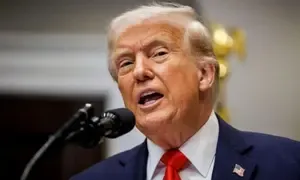Experts Say 90-Day US Tariff Relief Will Foster Sustainable Trade Agreements

Synopsis
Key Takeaways
- Temporary tariff relief provides space for businesses to stabilize.
- Policymakers can now focus on sustainable trade agreements.
- US tariffs remain a crucial factor in global trade dynamics.
- Supply chain disruptions may arise from the tax impacts.
- Export growth reached over $820 billion in fiscal 2024-25.
New Delhi, April 10 (NationPress) The temporary relief on the US reciprocal tariffs front provides businesses and India essential breathing room to stabilize supply chains and adjust operations, while also offering policymakers a chance to pursue more sustainable trade agreements, industry experts noted on Thursday.
US President Donald Trump has declared a reduced rate of 10 percent for 90 days in reciprocal tariffs for partner countries that have not retaliated with higher tariffs on American goods — such as India — while further increasing the levy on China to 125 percent for its countermeasures.
“President Trump’s 90-day pause on tariffs for India and several other nations reflects a tactical recalibration rather than a fundamental policy shift — yet it’s a positive development from both US consumer and global geopolitical perspectives,” stated Ashok Chandak, President of SEMI IESA.
While this pause allows for a reassessment of global trade dynamics, existing tensions and uncertainty remain due to the current 10 percent baseline tariff on most US imports and the future implications post-90 days, he added.
The implementation of country-specific tariffs is a significant advancement in the context of the global trade landscape.
“The repercussions extend beyond taxation and may lead to disruptions in supply chains, business models, and could potentially halt existing investment and business plans,” remarked Prashant Bhojwani, Partner, Tax and Regulatory Services, BDO India.
“In the short term, a slowdown in international trade is likely as rising consumer prices affect demand and consumption trends. In this scenario, businesses will need to reassess and, if necessary, reinvent supply chains and business models to incorporate cost efficiencies,” he added.
Meanwhile, Union Minister of Commerce and Industry, Piyush Goyal, engaged in discussions with the Export Promotion Councils and industry bodies here in light of the emerging trade landscape.
The meeting aimed to deliberate on the potential impacts and opportunities arising from the evolving and dynamic scenarios, as well as to inform the industry and trade about the government’s initiatives.
The minister praised exporters and the industry for achieving the highest-ever export figures of over $820 billion in the fiscal year 2024-25, marking nearly 6 percent growth over the previous fiscal year.









